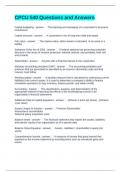Exam (elaborations)
CPCU 540 Questions And Answers
- Course
- Institution
CPCU 540 Questions And Answers Capital budgeting The planning and managing of a corporation's long-term investments Capital structure A corporation's mix of long-term debt and equity Previous Play Next Rewind 10 seconds Move forward 10 seconds Unmute 0:09 / 0:15 Full scr...
[Show more]



